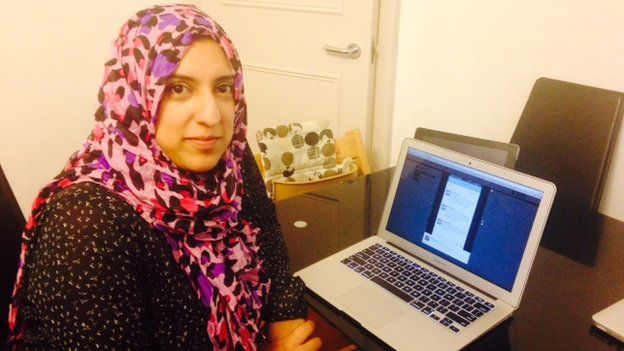Paris attacks prompt fresh concerns about online Islamophobia
- Published

Amid concerns over an increase in Islamophobic content on social media following the recent Paris attacks, BBC Asian Network has been hearing from Muslims about their experience of being the target of anti-Islamic sentiment online.
Activist Akeela Ahmed says she uses Twitter to campaign on equality issues. Her profile picture shows her in her hijab.
"If I tweet something to do with women's rights, I'll get tweets usually from men saying, 'How can you tweet that when you've got that thing on your head?' They're talking about my hijab.
"Post-Paris, the abuse increased and it was a lot worse," she says, referring to negative comments posted online following the attack on the French satirical magazine Charlie Hebdo, in which gunmen said they were killing in the name of Islam.
"One particular person was quite specific in their threats and wanting to kill Muslims. Normally, I'm not threatened by it, but on this occasion I was."
That Twitter account has been taken down. But there are concerns that some Islamophobic content remains online.
Campaigners from the organisation Tell Mama, which monitors hate against Muslims online, sent Asian Network some examples.
"When events like Paris happen, what seems to happen is that people on social media sites have bigger discussions,"says Bharath Ganesh.
"The language we've seen is extremely derogatory towards Muslims.
"Hashtags like #killallmuslims appear. Some Muslims used that hashtag to highlight anti-Islamic sentiments online."
'Anger'
Akeela says she understands where the anger stems from.
"As we see more terrorist incidents globally, many people feel anger about terror attacks and they go online and use their medium to vent their anger. But, as a result, there is an increase in anti-Muslim sentiment generally.
"On Facebook, it's a problem too. There are some groups who promote anti-Muslim sentiments. It's about dealing responsibly with these issues."
Facebook and Twitter both urge users to report anti-Islamic content. The Attorney General, Jeremy Wright - the government's legal adviser - has signalled he would like to meet with both firms to see what more can be done in this area.
#NotInMyName
Maaiysa Valli, a BBC journalist, was tweeting in a personal capacity when she used the #NotInMyName hashtag that Muslims have been using to distance themselves from extremists.
The photo was retweeted more than 400 times, with one response describing her as an "uneducated animal".
She says: "I got a few comments to start with that were saying things like, 'You shouldn't be following this religion.'
"Then Maajid Nawaz - the chairman of the Quilliam Foundation - retweeted it. He has more than 30,000 followers, and I got so many notifications."
She blocked and reported a number of users, and says the experience has made her aware of "how brave people can be behind a keyboard".
A number of accounts which targeted her have been disabled.
'Depressing'
Mehdi Hasan is the political director of the Huffington Post UK, and says he has had death threats online.
"It's pretty depressing. The number one issue that drives people up the wall on Twitter seems to be Islam. It's become so regular, you become immune to it. It's mainly anonymous people full of hatred.
"As a Muslim journalist in the public eye, it doesn't matter what you write about, all roads lead back to your faith.
"On the one hand, I expect abuse when I write about terrorism or the halal meat hysteria.
"What I don't understand is how everything is related back to Islam - for instance, even if I interview a politician about austerity, people will say, 'Oh, it's because you're a Muslim you're writing that.'"
In a statement, Twitter said: "We review all reported content against our rules which include a ban on targeted abuse and direct, specific threats of violence against others."
Meanwhile, a Facebook spokesperson said: "We take hate speech seriously and remove any content reported to us that directly attacks others based on their race, ethnicity, national origin, religion, sex, gender, sexual orientation, disability or medical condition.
"With a diverse global community of more than a billion people, we occasionally see people post content which, whilst not against our rules, some people may find offensive."
'Right balance'
Facebook also spoke about the power of counter speech, which involves people challenging other users online.
It added: "We aim to strike the right balance between giving people the freedom to express themselves and maintaining a safe and trusted environment."
Akeela says that she hopes Twitter and Facebook do more to tackle Islamophobic abuse online: "Ordinary Muslims are getting abuse for expressing their views.
"I worked for a Muslim youth charity for a number of years, and have received Islamophobic abuse online for a while. But it has got worse."
You can listen to BBC Asian Network's original report by clicking on this link.
- Published12 January 2015
- Published23 January 2015
- Published23 January 2015